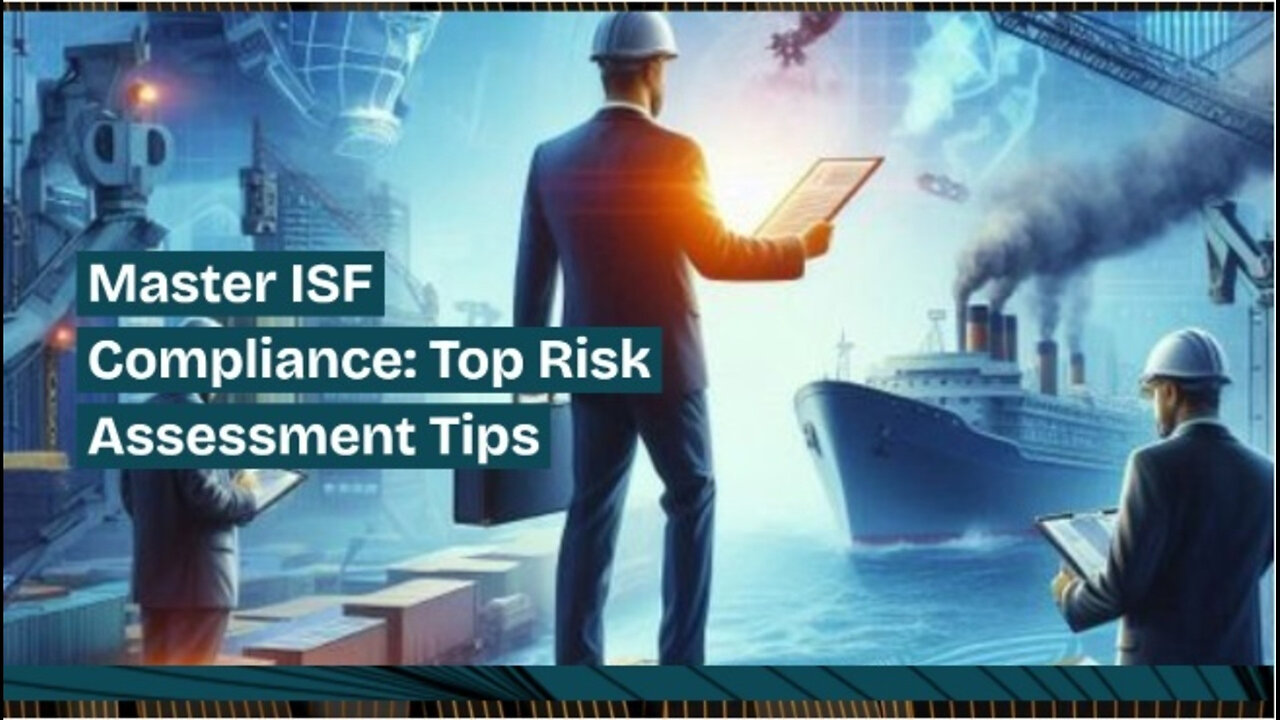Premium Only Content

Mastering ISF Compliance: Best Practices and Risk Assessment Strategies
ISF Checklist || 805-970-7918 || contact@isfchecklist.com || www.isfchecklist.com
In today's video, we explored the best practices for ISF compliance and effective risk assessment strategies. We began by discussing the importance of customs bonds as a guarantee to the CBP for the payment of duties, taxes, and fees on imported goods. Moving on to ISF compliance, we highlighted that it is a mandatory requirement for all ocean shipments entering the United States and requires importers to provide specific information about their cargo to the CBP.
To achieve effective ISF compliance, we highlighted several best practices. First, establishing a robust ISF compliance program within the organization is crucial, which outlines responsibilities and procedures and assigns dedicated staff for oversight. Secondly, conducting thorough due diligence to verify information accuracy and compliance with regulations is essential for effective risk assessment. Thirdly, maintaining open lines of communication with all stakeholders involved in the import process is vital to avoid misunderstandings and mitigate risks. Lastly, implementing advanced technology and automation through integrated customs brokerage software can streamline the ISF compliance process and reduce the risk of errors.
In conclusion, effective ISF compliance is crucial for a smooth customs clearance process and mitigating potential risks. By following the best practices and implementing proper risk assessment strategies, importers can ensure compliance and efficiency in their import process. Stay tuned for more informative videos on customs brokerage and international trade.
#usimportbond #isfcustomsbroker #uscustomsclearing #isfentry
Video Disclaimer Here: This video is purely educational and has no ties with the US government.
00:18 ISF Compliance and Risk Assessment: Understanding the importance of customs bonds and ISF compliance for all ocean shipments entering the United States.
01:21 Best Practices for Effective ISF Compliance: Establishing a robust ISF compliance program, conducting thorough due diligence for risk assessment, and maintaining open communication with stakeholders.
02:45 Utilizing Technology for Streamlined Compliance: Implementing advanced technology and automation to improve efficiency, accuracy, and reduce the risk of errors in the ISF compliance process.
-
 1:49:50
1:49:50
Winston Marshall
2 days agoThe DARK Reality of Socialism - Historian Giles Udy
14.1K44 -
 1:09:28
1:09:28
Sports Wars
2 hours agoBengals STAY ALIVE In OT Thriller, ESPN's Ryan Clark SLAMMED, NFL DESTROYS NBA On Christmas
8.31K1 -
 9:37
9:37
EvenOut
20 hours ago $1.83 earnedThe Non-Reflecting Mirror Scare Twin Prank!
17.3K1 -
 11:19
11:19
Tundra Tactical
19 hours ago $2.25 earnedI Saw How CMMG Makes Guns.
24.7K6 -
 15:34
15:34
Misha Petrov
15 hours agoReacting To TikTok’s Most DELUSIONAL Takes!
31.3K21 -
 1:52:24
1:52:24
Squaring The Circle, A Randall Carlson Podcast
1 day ago#032 Flournoy Holmes' Artwork Helped Define The Southern Rock Phenomenon of The Early 1970's
15.6K3 -
 19:56
19:56
inspirePlay
1 day ago $0.21 earnedWalking with Lions & Facing Africa’s Wild Side | Safari Adventure with the Grid Championship Crew!
8.97K1 -
 10:50
10:50
RTT: Guns & Gear
1 day ago $0.72 earnedBudget Friendly Carry 2011: EAA Girsan Brat 2311
10.6K3 -
 3:49:06
3:49:06
Alex Zedra
16 hours agoLIVE! New Game | Nuclear Nightmare
102K14 -
 25:08
25:08
MYLUNCHBREAK CHANNEL PAGE
1 day agoUnder The Necropolis - Pt 2
288K78